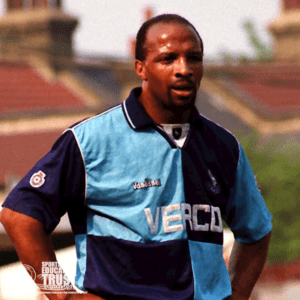Black History Month
Black History Month runs throughout October 2021, so here at Wycombe Wanderers Sports and Education Trust (WWSET), we will be taking a look at some of some of the most prominent black pioneers throughout the history of this great sport we call football, and how black players have made a huge impact on the game.
Arthur Wharton (1865-1930)
Ghana-born goalkeeper, Arthur Wharton, is widely considered to be not only Englands but the worlds first Black professional footballer. Wharton started his footballing career at Darlington and was also a key player in Preston North End’s so-called ‘Invincibles’ side of the 1880s.
Wharton was quick and athletic, even setting a new world record for the 100-yard dash (ten seconds flat) at Stamford Bridge in 1886. On 16 October 2014, the FA unveiled a statue honouring him at St George’s Park.

Emma Clarke (1876-1905)
Britain’s first-known black female footballer was first described by the South Wales Daily News as “the fleet-footed dark girl on the right-wing.”
Clarke made her professional debut for the British Ladies side in 1895 in Crouch End in front of a crowd of just over 11,000 fans and graced famous stadiums like Wembley, St James’ Park and Portman Road.
Clarke also played in goal, although she was actually confused for decades with fellow keeper Carrie Boustead, who was originally billed as the first Black female footballer until historian Stuart Gibbs discovered she was actually white a couple of years ago. Clarke is remembered this Black History Month.

Tony Collins (1926-)
95-year-old Tony Collins became England’s first Black manager when he took charge of Rochdale in 1960, leading them on a fairytale run to the 1962 League Cup final, where they unfortunately lost 3-0 at home and 1-0 in Norfolk (a 4-0 aggregate defeat) to Norwich City.
A former left-winger who made 90 appearances for Watford (where he is pictured below with then chairman, Elton John), Collins received the Service to Football Award at the 2017 League Managers Association Awards.
He was caretaker manager for Bristol City and chief scout for Don Revie at Leeds United. When Revie became England manager in 1974, Collins helped compile dossiers on various opponents. When one was leaked to the media ahead of a game against Scotland, Collins was given the nickname, ‘Football’s Superspy’.

John Charles (1944-2002)
The West Ham United defender first represented England’s youth teams on 20 May 1962, and thus became the first Black player to feature for a representative team when he scored against Israel in Tel Aviv in a UEFA tournament, a 3-1 win for the Young Lions.
In March 1963, the U18s travelled for a game in Switzerland and on 21 March 1963 he was in the side that beat the Swiss by 7-1 in Bienne. He also played in and won the 16th International Youth Tournament which was held at the now extinct Shepherd’s Bush Stadium in London from the 11-23 April 1963. John also played for Young England v England at Highbury in April 1967, when they beat the World Cup winning team by 5-0.
‘Young England’ was for players aged up to 23 and John was 21 on this date. He went on to play over 100 games for the Hammers before retiring. Canning Town-born John passed away in August 2002 at the age of 57.

Benjamin Odeje (1955-)
In 2013 The FA, in conjunction with BBC London, were able to confirm the 64-year-old was the first Black footballer to represent England schoolboys. In March 1971, the then 15-year-old was called up for England schoolboys in a 1-0 win over Northern Ireland.
Odeje was known as ‘Pele’ by his teammates after he scored almost 400 goals in youth football. He went on to play for Charlton Academy, Hendon, Clapton and Dulwich Hamlet, while after retiring he coached at Queens Park Rangers, too.

Viv Anderson (1956-)
Anderson was the first Black player to win a senior England cap in 1978 against Czechoslovakia. The speedy and tenacious right-back went on to claim 30 caps and was part of the squads at two World Cups – Spain 1982 and Mexico 1986 – although he didn’t make an appearance at either.
Anderson played under Brian Clough at Nottingham Forest – who he has often praised for helping him deal with racist abuse – and was Sir Alex Ferguson’s first signing (along with Brian McClair, who joined at the same time) at Manchester United in 1987.

Paul Ince (1967-)
Paul Emerson Carlyle Ince spent the majority of his playing career at the highest level. After leaving West Ham United he joined Manchester United for a coll one million pounds, where he would go on to win multiple team and individual accolades.
After two years in Serie A with Inter Milan, he returned to England to play in the top flight for Liverpool, Middlesbrough and Wolves. After a spell as player-coach of Swindon Town, he retired from playing while player-manager of Macclesfield Town in 2007. He went on to manage our Bucks neighbours MK Dons, Blackburn Rovers, Notts County and, after an almost two-year break, Blackpool.
Ince won 53 caps for England, scoring two goals. In June 1993, against the United States of America, Ince became the first black captain of the England Men’s National Team. The side actually lost 2-0, but it would be the only defeat that Ince would suffer as England captain as he went on to wear the armband on seven occasions.
“For me, it was the pinnacle of my career when Graham Taylor made me captain, but I can remember feeling uncomfortable with the questions,” Ince told the Daily Mail at the time.“I just wanted to be the England captain; I didn’t want to be remembered as the first black England captain because I didn’t look at it in that way.

Cyrille Regis (1958-2018)
Regis scored 112 goals in 297 appearances for West Bromwich Albion and also played for Aston Villa and Coventry in the English top-flight, winning the 1987 FA Cup with the latter.
A true pioneer for Black footballers, he played alongside Lawrie Cunningham and Brendan Batson during his time at the Hawthorns, with the trio nicknamed the ‘Three Degrees’ by their then-manager Ron Atkinson.
Regis joined us here at Wycombe Wanderers in August 1994, where he formed a formidable strike partnership with Simon Garner, he made 35 appearances and scored 10 goals in his only season with us.
Regis won his first England cap in 1982 in a 4-0 victory over Northern Ireland. He sadly died in January 2018 of a heart-attack, but will always be remembered for paving the way for future generations of Black footballers. Black History Month recognises Cyrille’s achievements, as we do here at WWSET.

Luther Blissett (1958-)
The Jamaican-born striker became the first Black player to score a hat-trick for England, netting three times on his debut in a 9-0 victory over Luxembourg in 1982.
Domestically, he is best known for his fruitful partnership with John Barnes at Watford and spells with AC Milan (who he joined for £1 million in 1983) and AFC Bournemouth. Blissett still holds Watford’s all-time records for both appearances (503) and goals (186).

Uriah Rennie (1959-)
Uriah Rennie was one of England’s top referees. At his peak, the now 60-year-old was described by Keith Hackett (the FA’s Head of the Professional Game Match Officials Board) as “the fittest referee we have ever seen on the national or world scene”.
Rennie took charge of over 300 Premier League games and officiated the 2001 play-off Final as Bolton Wanderers beat Preston North End 3-0 at Cardiff’s Millennium Stadium.
Rennie retired in 2004 and is now president of Hallam FC, who play at the world’s oldest football ground, Sandygate Road, in Sheffield. He has also recently been elected as an FA Council member, representing the Sheffield and Hallamshire County FA.

John Barnes (1963-)
Heralded as one of Liverpool and Watford’s greatest stars, Barnes won 79 England caps. Born and raised in Jamaica, he moved to London when he was 12 and after starting his career with Watford went on to win two titles at Anfield after his move north, with his speed and vision mesmerising fans all over the world.
He was also voted the 1988 PFA Players’ Player of the Year. Both as a player, and since retiring, Barnes has been a voice on issues such as racism and discrimination, appearing regularly at rallies and, most recently, as a guest on BBC One’s political affairs programme Question Time.

Hope Powell (1966-)
The 53-year-old is currently manager of Brighton Women in the FA WSL, but is perhaps best-known for her tenure the first female and Black manager of any England national team.
After winning 66 caps for England Women, scoring 35 times, Powell took charge of the Lionesses between 1998-2013, winning the Cyprus Cup in 2009 and 2013. She was also the first female ever to obtain a UEFA Pro licence –the highest qualification available to a coach in Europe. Powell is recognised this Black History Month.



